18 Interesting Facts about Greece
Greece, a land where ancient history intertwines with stunning landscapes and fascinating culture, invites travellers to discover its timeless wonders. From the majestic ruins of Athens to the serene islands of the Aegean, Greece offers a captivating blend of the old and the new. Join us on a journey as we explore 18 fascinating facts that showcase the essence of this remarkable country.
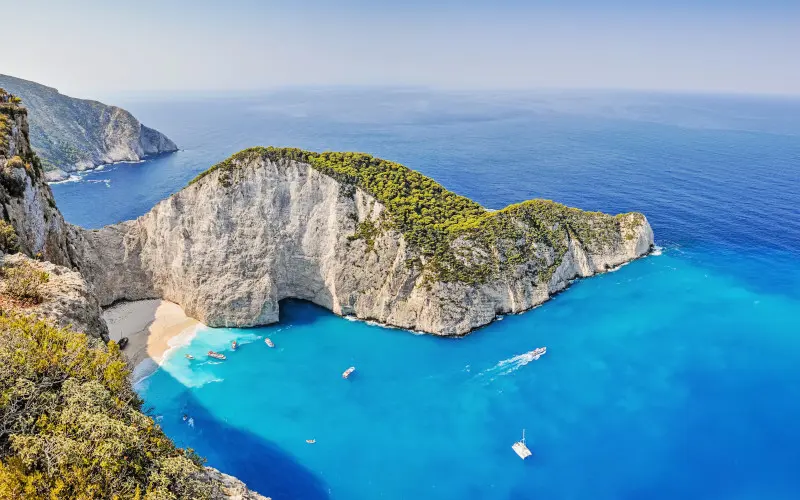
1. Greece is one of the sunniest countries in Europe
With over 250 days of sunshine per year, Greece is one of Europe’s sunniest destinations. This sunny climate makes it a popular spot for travellers seeking warmth and clear skies.
2. Athens is the birthplace of democracy
Athens, Greece, is celebrated as the birthplace of democracy. In the 5th century BC, the Athenians developed a system where citizens could participate in decision-making, laying the foundation for modern democratic governance.
3. The Acropolis of Athens is a UNESCO World Heritage site
The Acropolis, a UNESCO World Heritage site, stands as a testament to ancient Greek civilisation. Constructed in the 5th century BC, it includes iconic structures such as the Parthenon, dedicated to the goddess Athena.
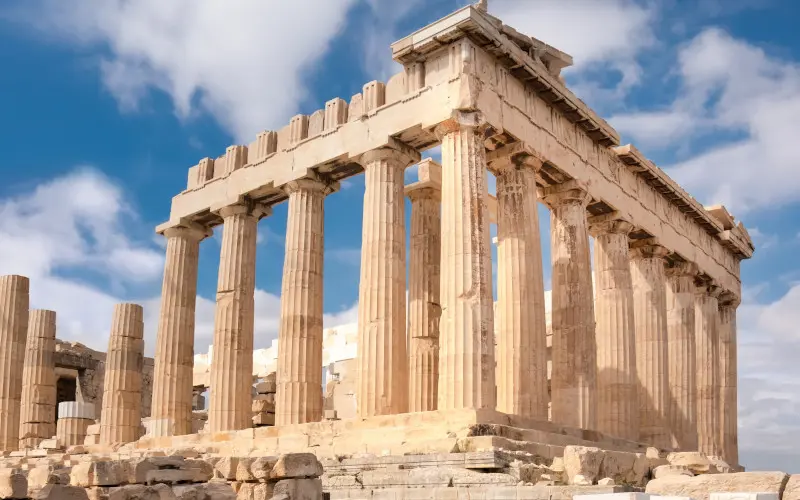
4. Greece boasts more than 6,000 islands
Greece is home to over 6,000 islands, of which about 227 are inhabited. The islands, including Santorini, Mykonos, and Crete, are renowned for their picturesque landscapes, crystal-clear waters, and rich cultural heritage.
5. Greece is home to unique endemic wildlife
Greece’s diverse landscapes, from mountains to islands, host unique wildlife, including the Kri-Kri goat in Crete and the endangered Mediterranean monk seal.
6. The Olympic Games originated in Greece
The Olympic Games originated in Olympia, Greece, in 776 BC. These games were held in honour of Zeus and featured various athletic competitions. The modern Olympics revived this tradition in 1896 in Athens.
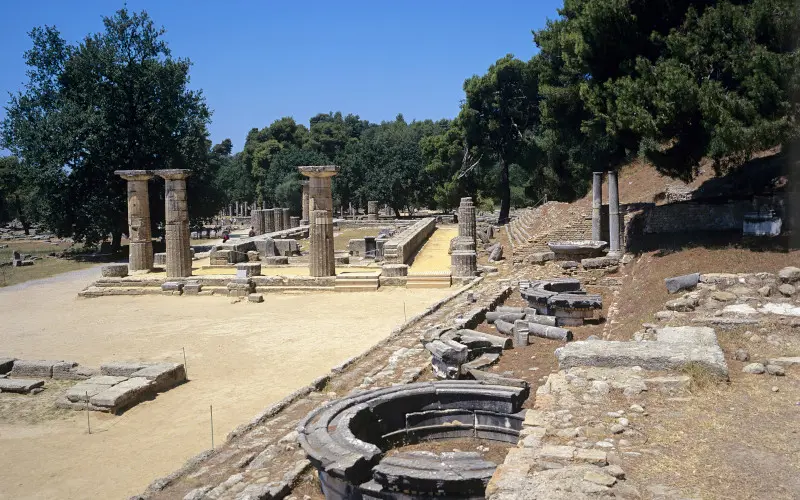
7. The Greek alphabet is the basis for many alphabets
The Greek alphabet, developed around 1000 BC with 24 distinct letters like alpha (α) and omega (ω), is the basis for many alphabets, including the Latin script used in English. Greek, one of the oldest recorded living languages with a history spanning over 3,400 years, has profoundly influenced scientific, medical, and philosophical terminology worldwide.
8. Greek Mythology is a cornerstone of Western literature
Greek mythology is a cornerstone of Western literature and culture. Stories of gods, heroes, and mythical creatures like Zeus, Hercules, and the Minotaur continue to captivate and inspire people around the world. The Aegean Sea, steeped in mythology, adds to this rich legacy; it is said to be named after Aegeus, the father of Theseus, who leaped into the sea believing his son was dead.
9. Greek architecture has influenced Western building styles
Greek architecture, characterised by columns and symmetry, has influenced Western building styles. Notable examples include the Doric (sturdy and plain), Ionic (elegant with scroll-like capitals), and Corinthian (ornate with acanthus leaves) columns seen in ancient temples and modern structures.
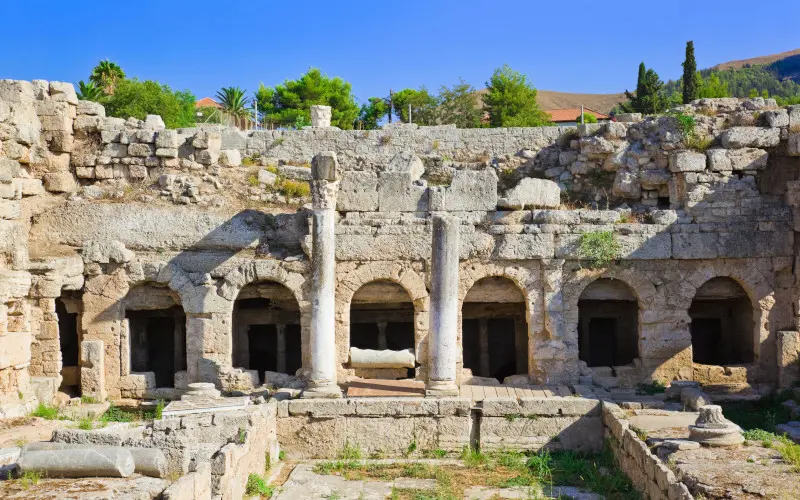
10. Greek cuisine is popular worldwide
Greek cuisine is celebrated for its use of fresh, local ingredients. Staples include olives, feta cheese, lamb, and seafood. Traditional dishes like moussaka, souvlaki, and baklava highlight the country's culinary heritage.
11. Greece has a strong coffee culture
Coffee is an important part of daily life in Greece, with traditional coffee houses known as “kafeneio” being popular social spots. Greek coffee, usually served thick and strong, is a staple of local culture, and the frappe, a cold, foamy coffee drink, was also invented in Greece.
12. The Agora is an ancient marketplace
The Agora of Athens was a bustling marketplace and the centre of public life in ancient Greece. It served as a hub for commerce, politics, and social gatherings, reflecting the vibrant community life of the time.
13. Greece is a country of traditions
Greece is known for its traditions, such as the celebration of Easter, often considered the most important religious and cultural event of the year. It involves elaborate church services, feasting, and fireworks. Traditional Greek dances like the sirtaki also play a significant role in cultural festivities.
14. Greece is famous for its ancient theatres
Greek theatres, such as the Theatre of Epidaurus, are renowned for their remarkable acoustics and design. These ancient venues hosted dramatic performances that were an integral part of Greek culture and religious festivals.
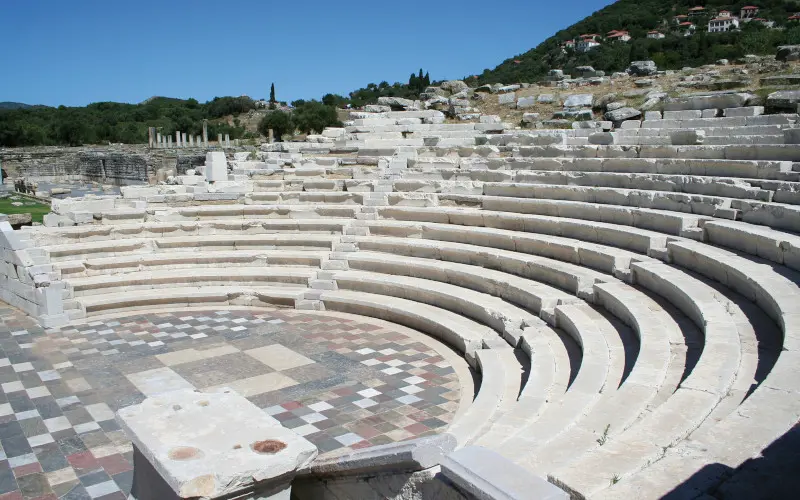
15. The Oracle of Delphi was a sacred sanctuary
In ancient times, the Oracle of Delphi was a significant religious sanctuary where people sought guidance. The priestess Pythia would deliver cryptic prophecies, influencing decisions across the Greek world.
16. Greece's Byzantine legacy continues to thrive today
Greece's history includes the Byzantine Empire, which left a lasting impact on its art, architecture, and religion. Byzantine churches, with their distinct domes and mosaics, are a common sight throughout the country.
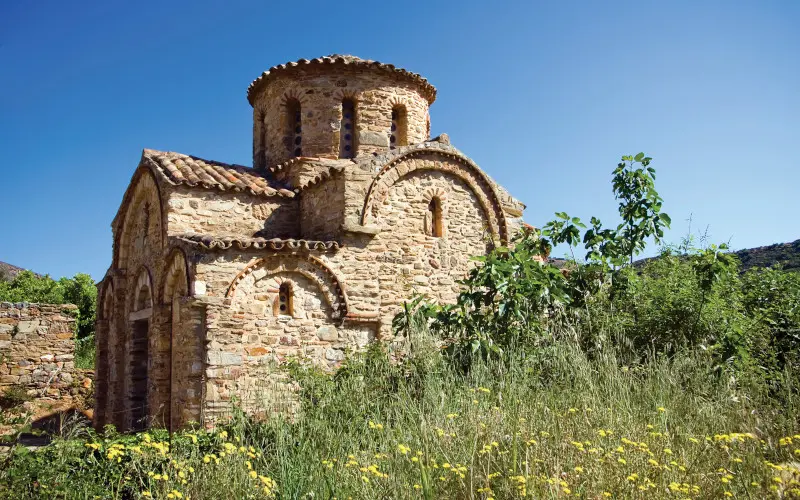
17. Alexander the Great spread Greek culture across three continents
Born in 356 BC in Pella, Alexander the Great created one of the largest empires in history by the age of 30. His conquests spread Greek culture and influence across three continents, leaving a lasting legacy.
18. The Minoans were one of Europe's earliest known civilisations
The Minoan civilisation, centred on the island of Crete, is one of the earliest recorded civilisations in Europe. Known for its advanced architecture and vibrant frescoes, it thrived from approximately 3000 to 1100 BC.
Explore Greece with Travelsphere
Embark on a journey to uncover the timeless wonders of Greece with Travelsphere's meticulously curated Greece escorted tours. Designed to showcase Greece's rich cultural heritage and stunning landscapes, our itineraries promise unforgettable experiences at every turn.
Choose our Classic Greece and Iconic Aegean Islands Cruise for an exploration of Greece's iconic landmarks and hidden gems. Alternatively, experience the natural beauty of Greece with our Wildflowers of Crete Tour, which takes you through the stunning landscapes and diverse flora of Crete.
Discover more about Greece's diverse offerings and book your journey today with Travelsphere's Greece tours.















